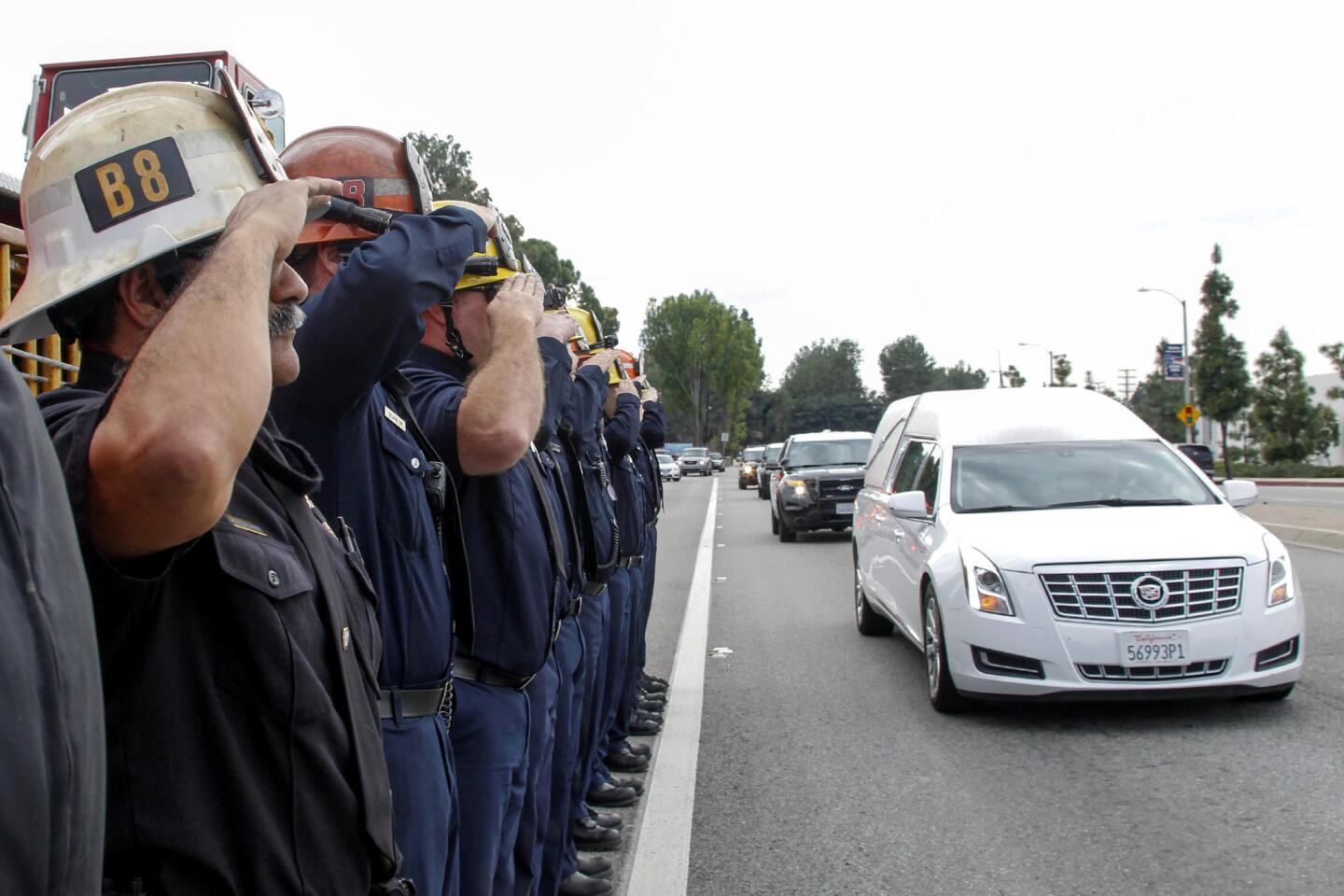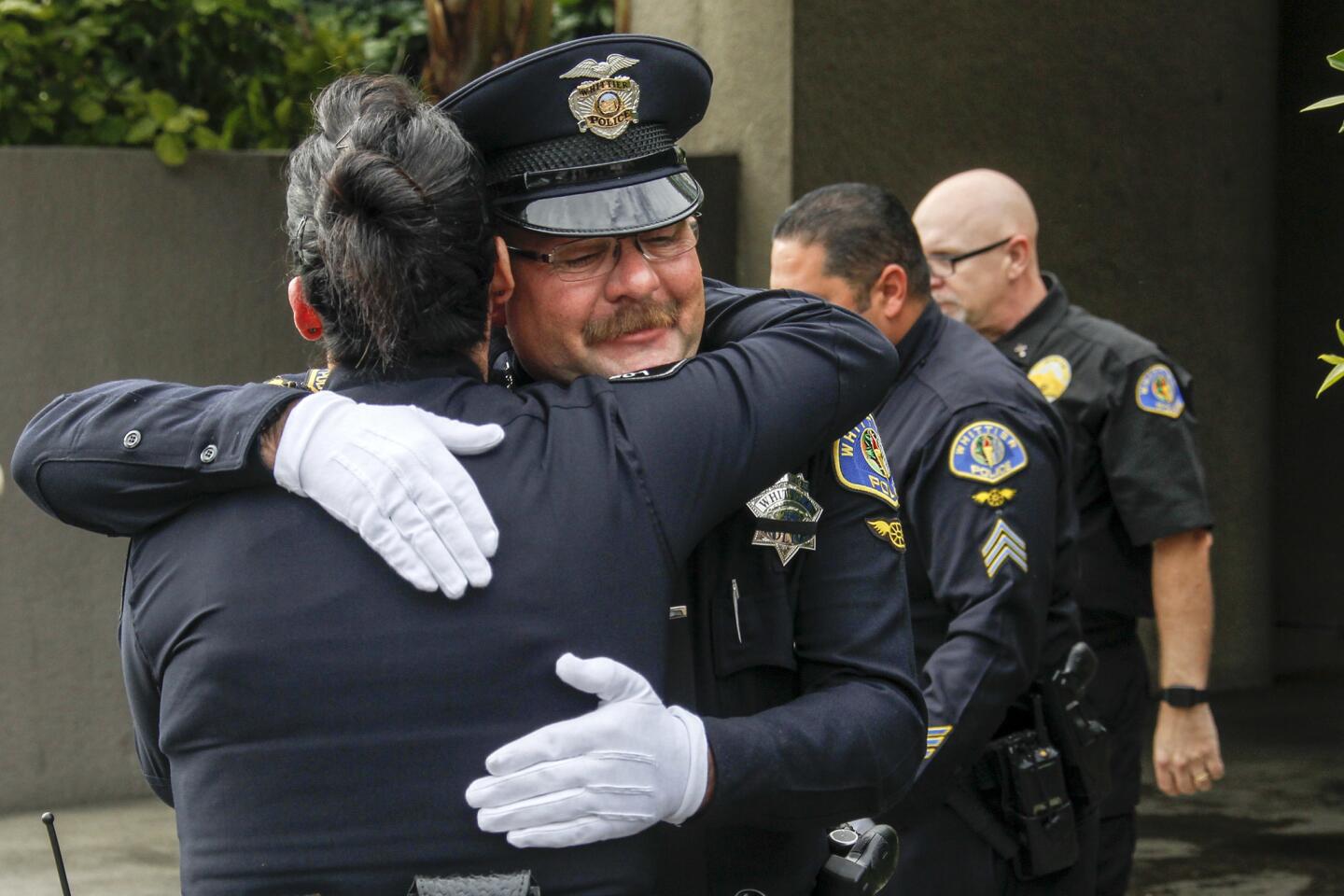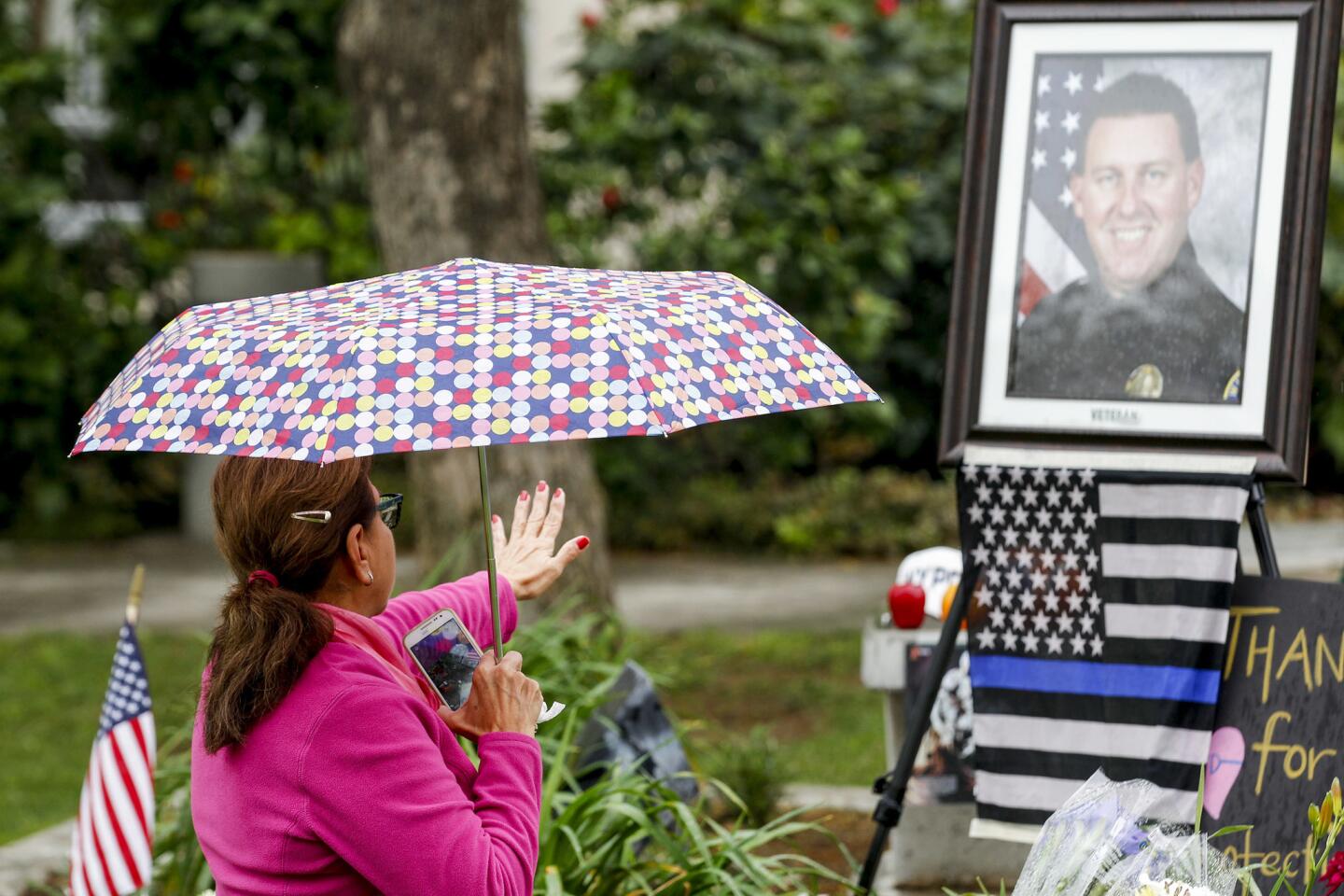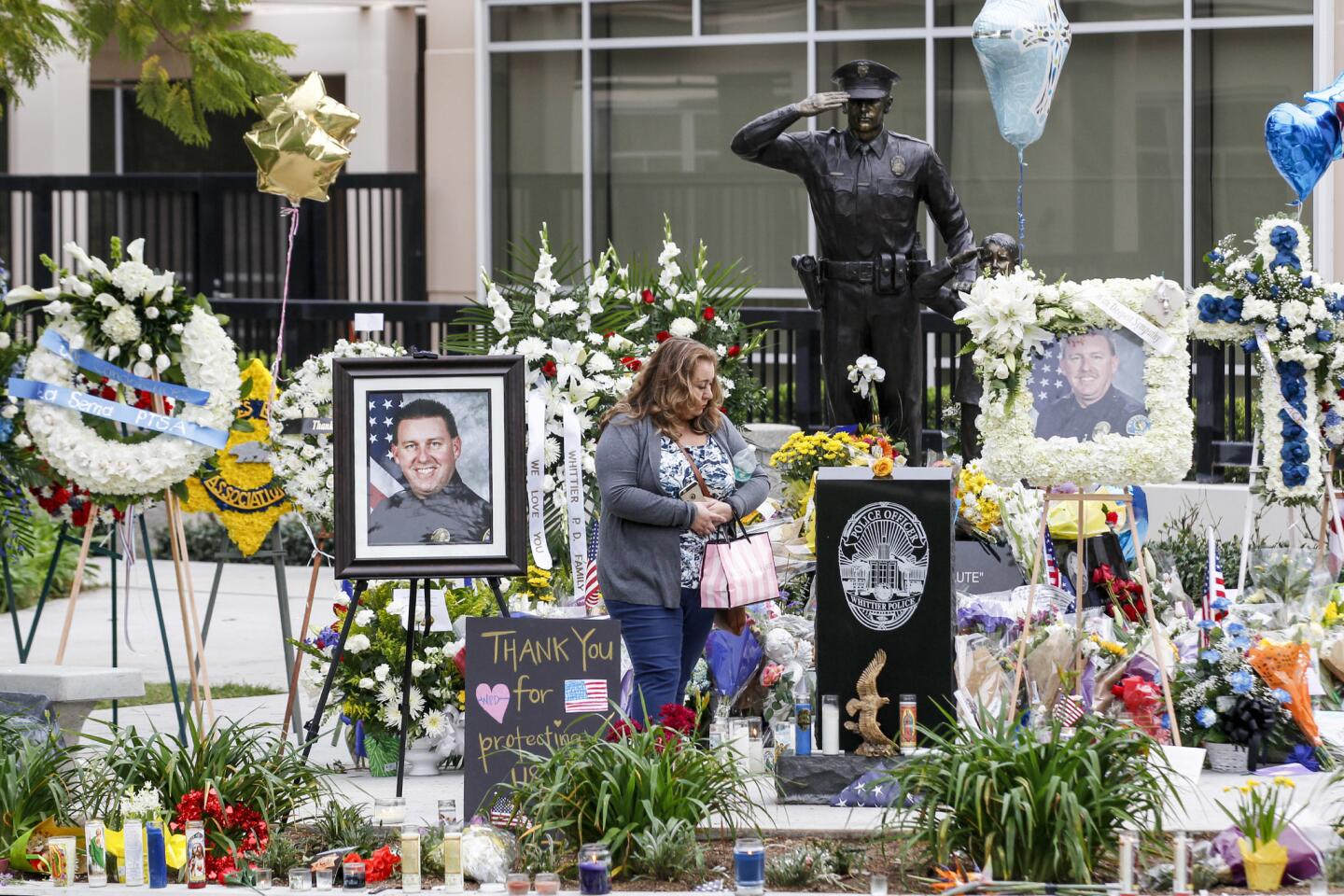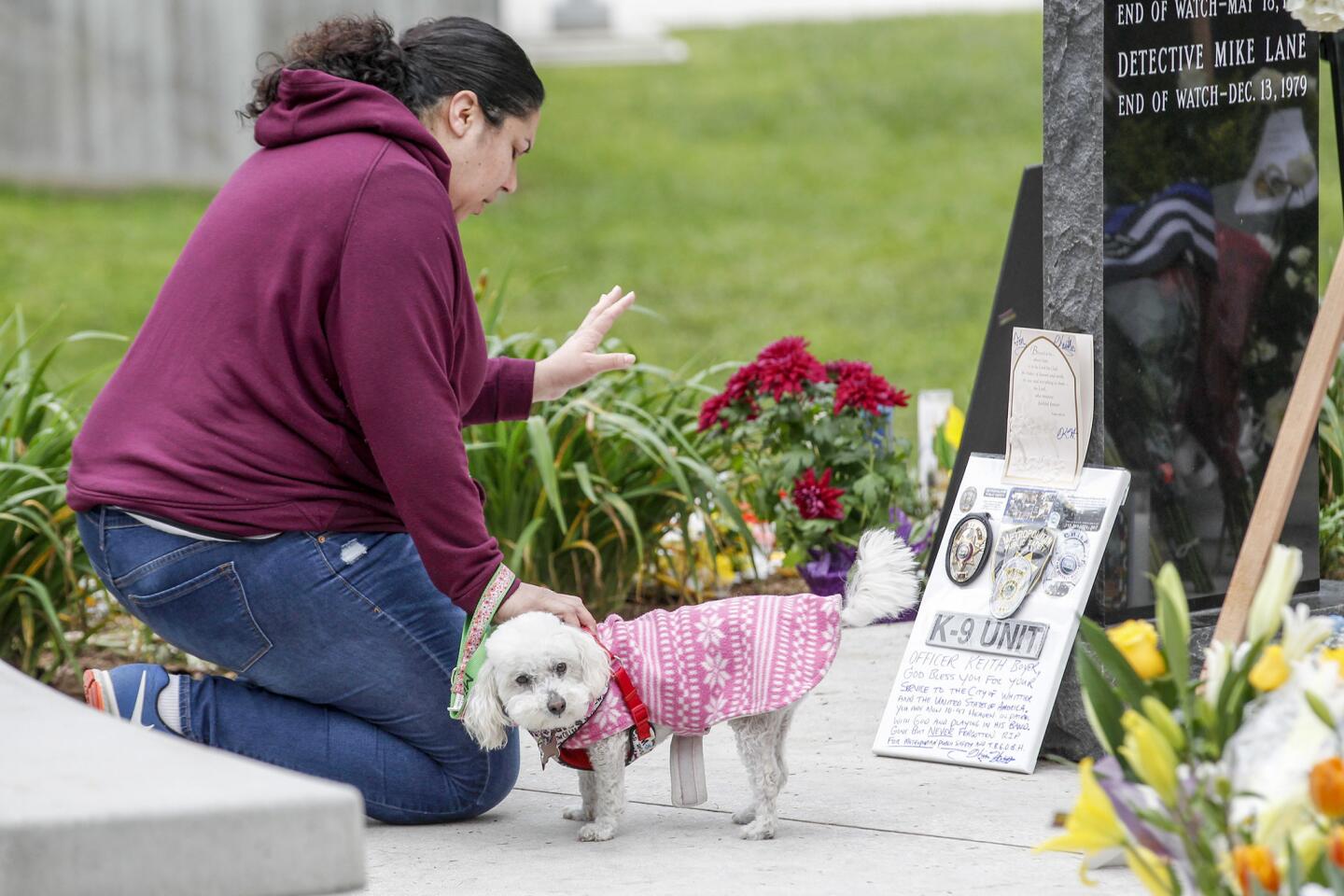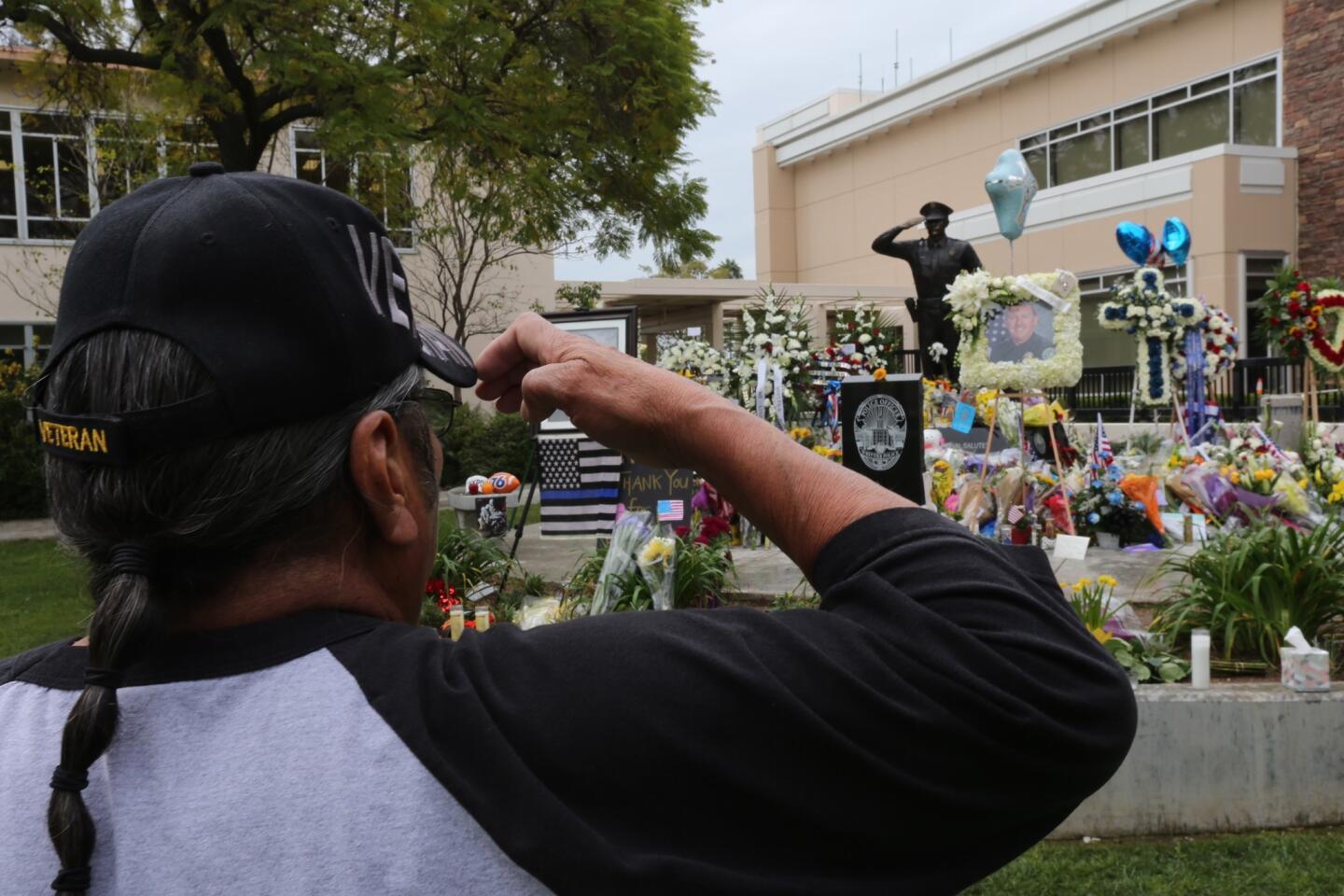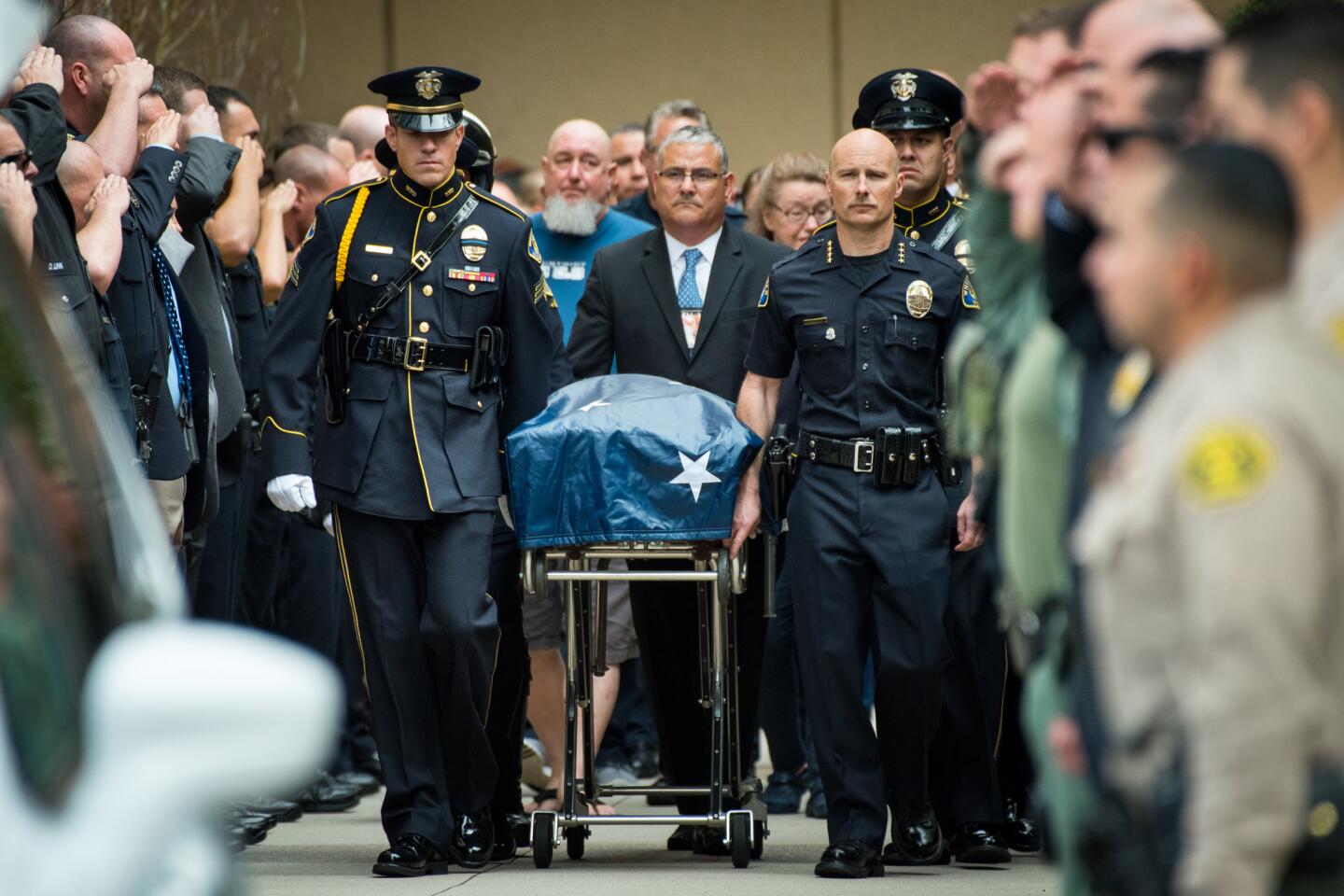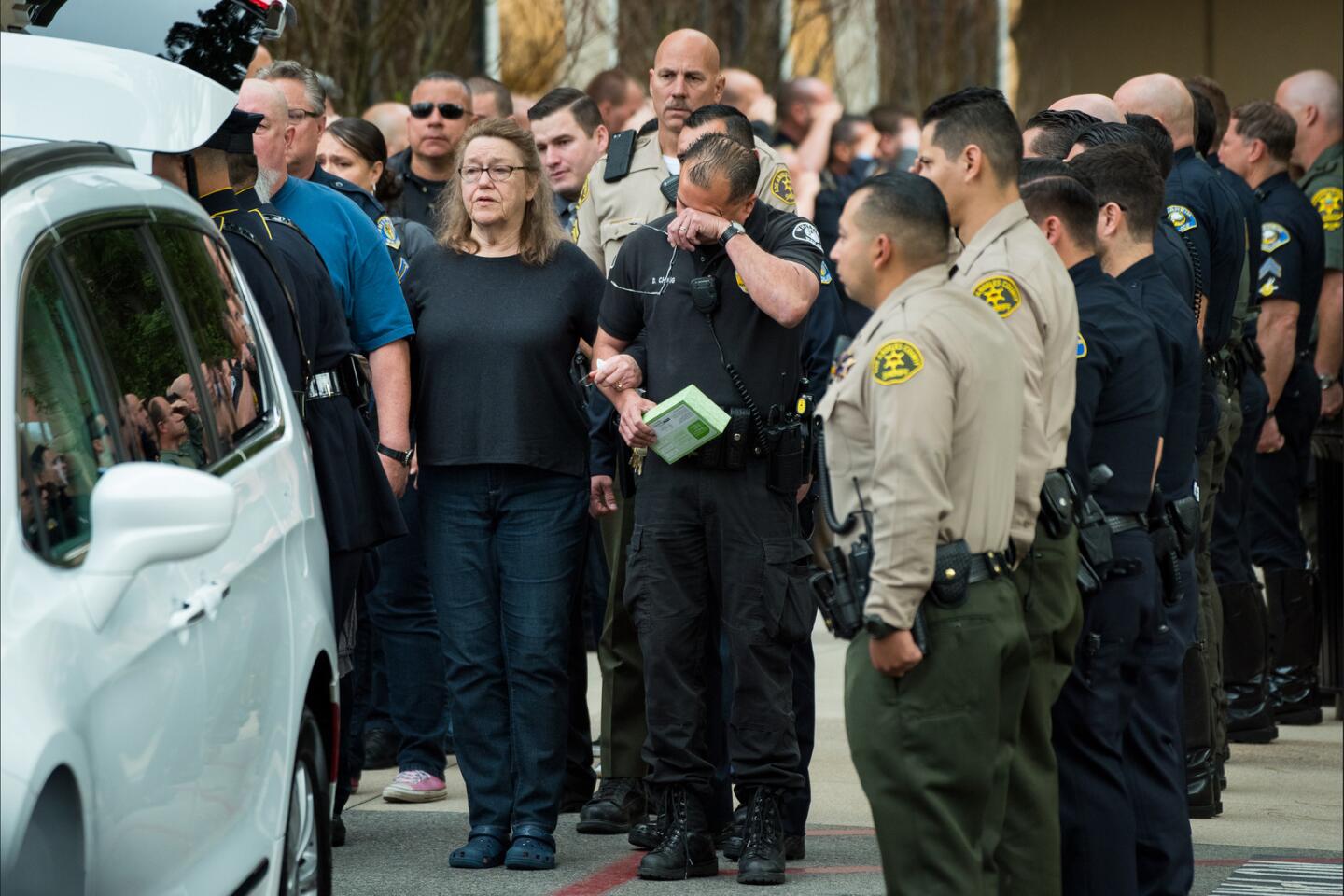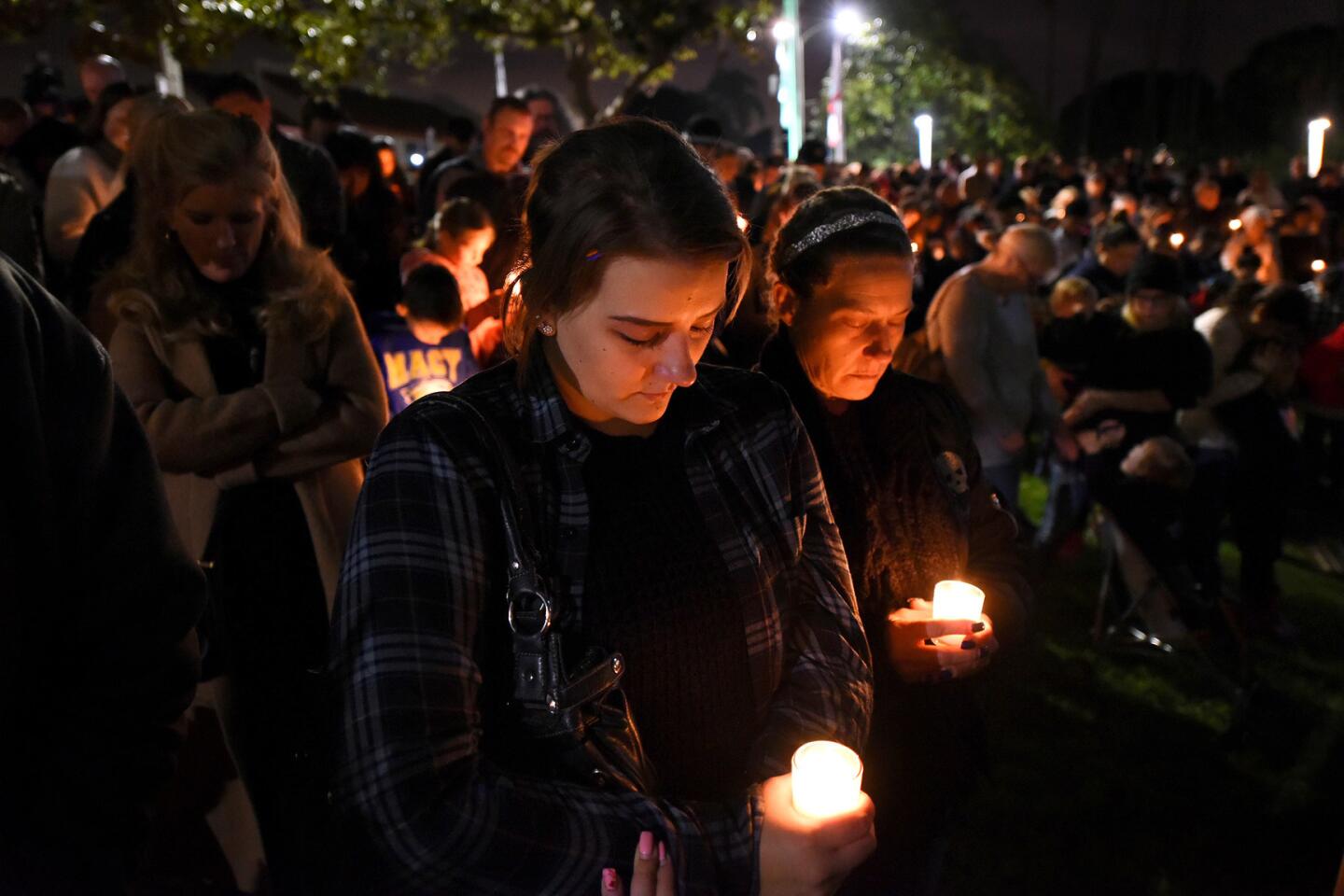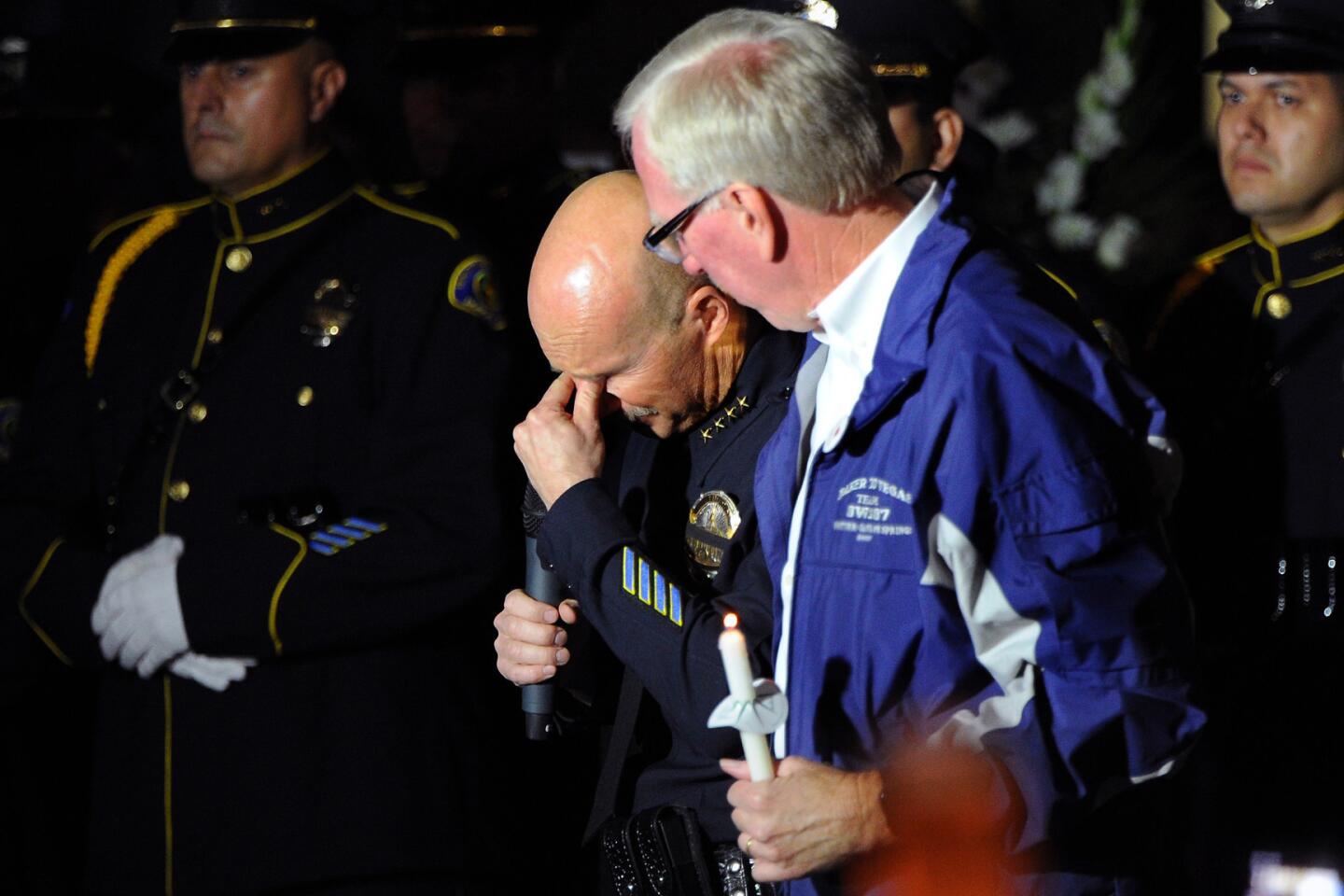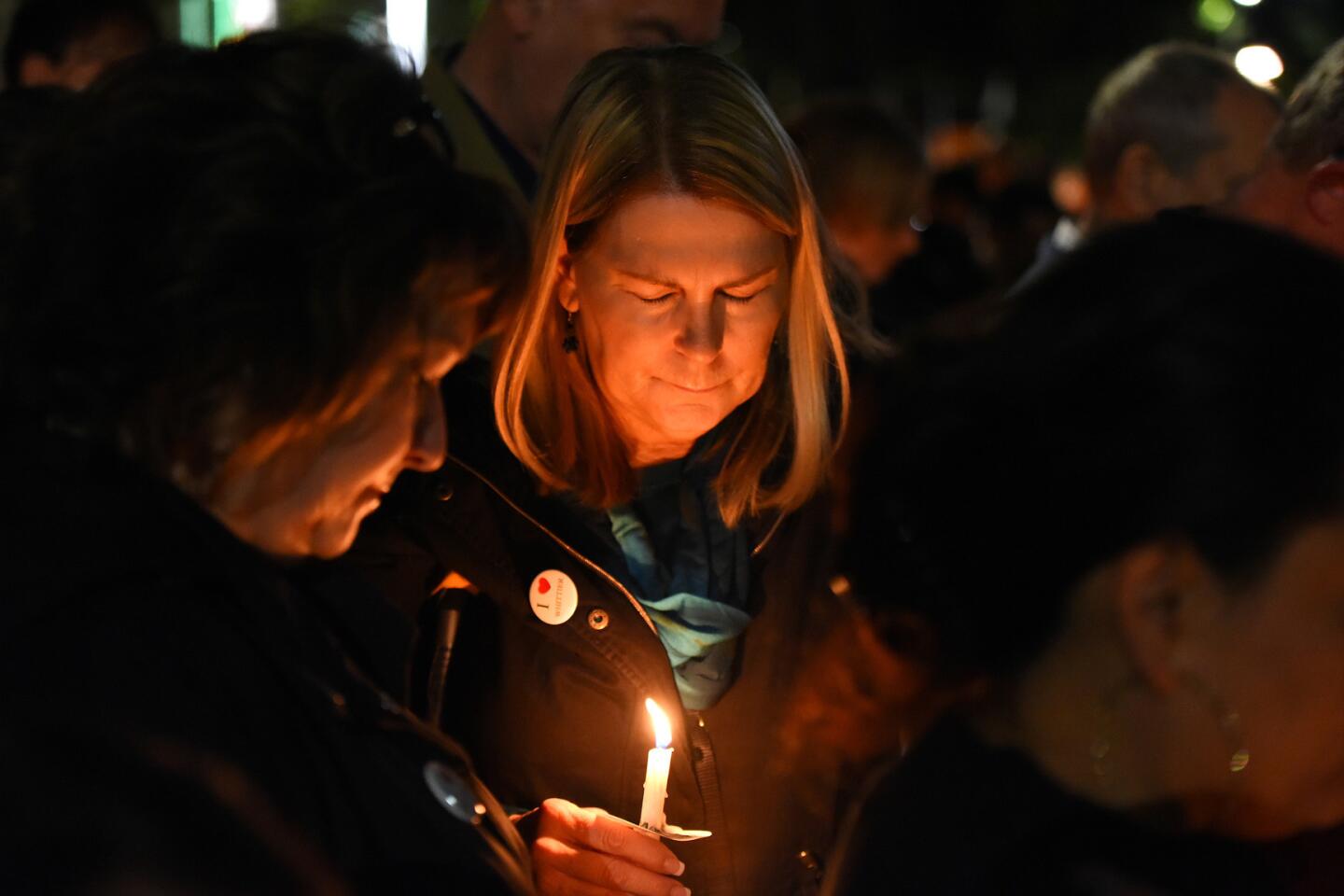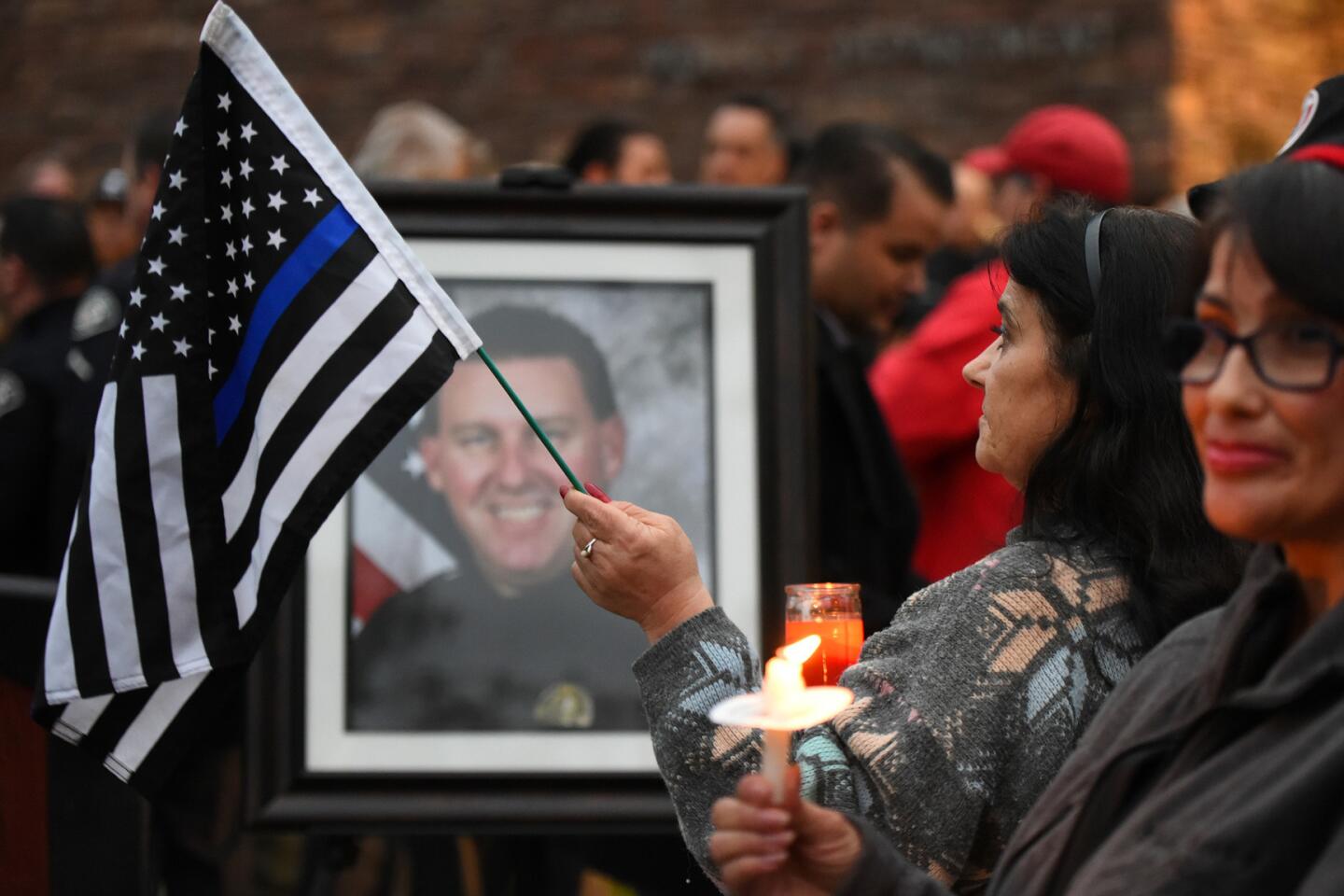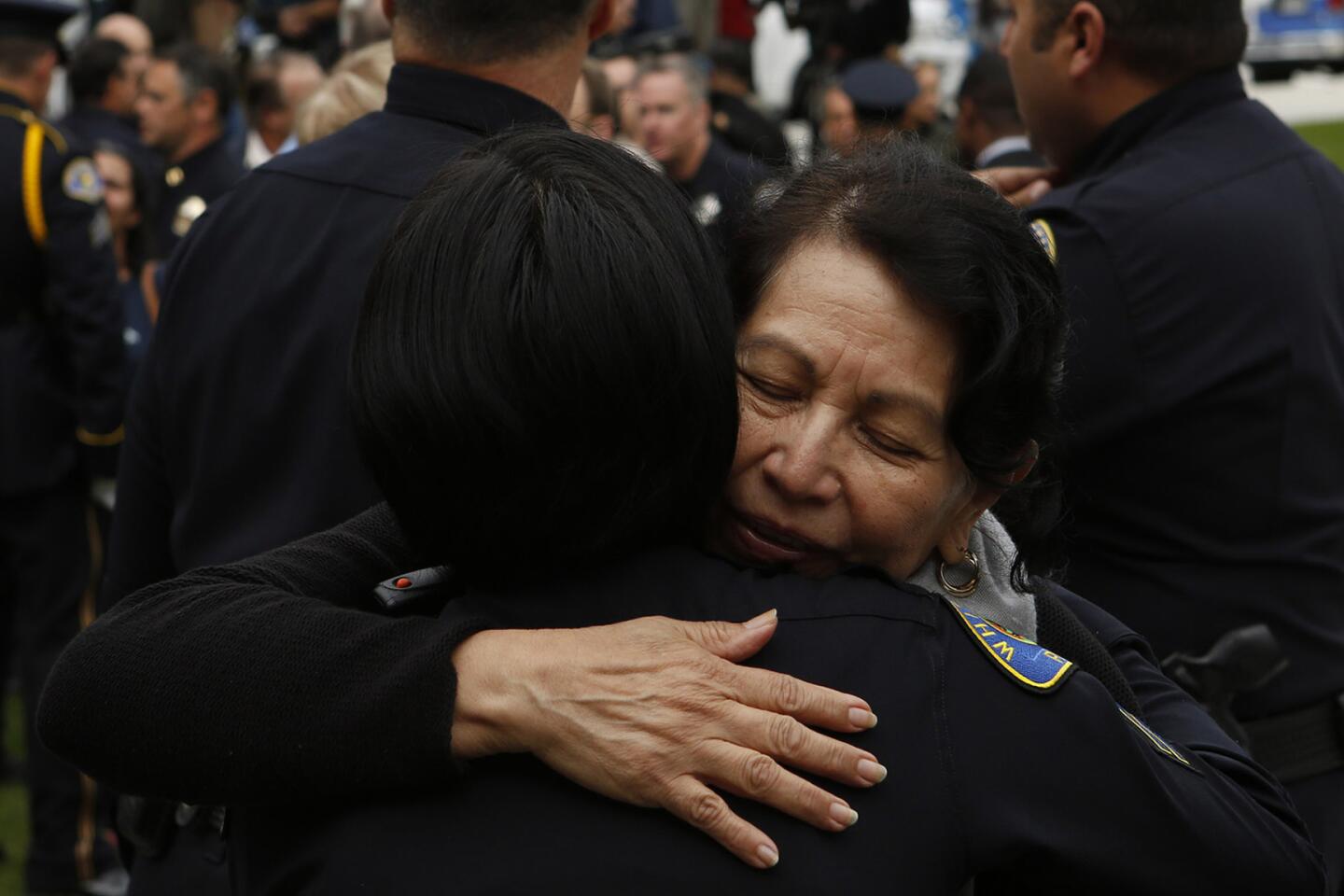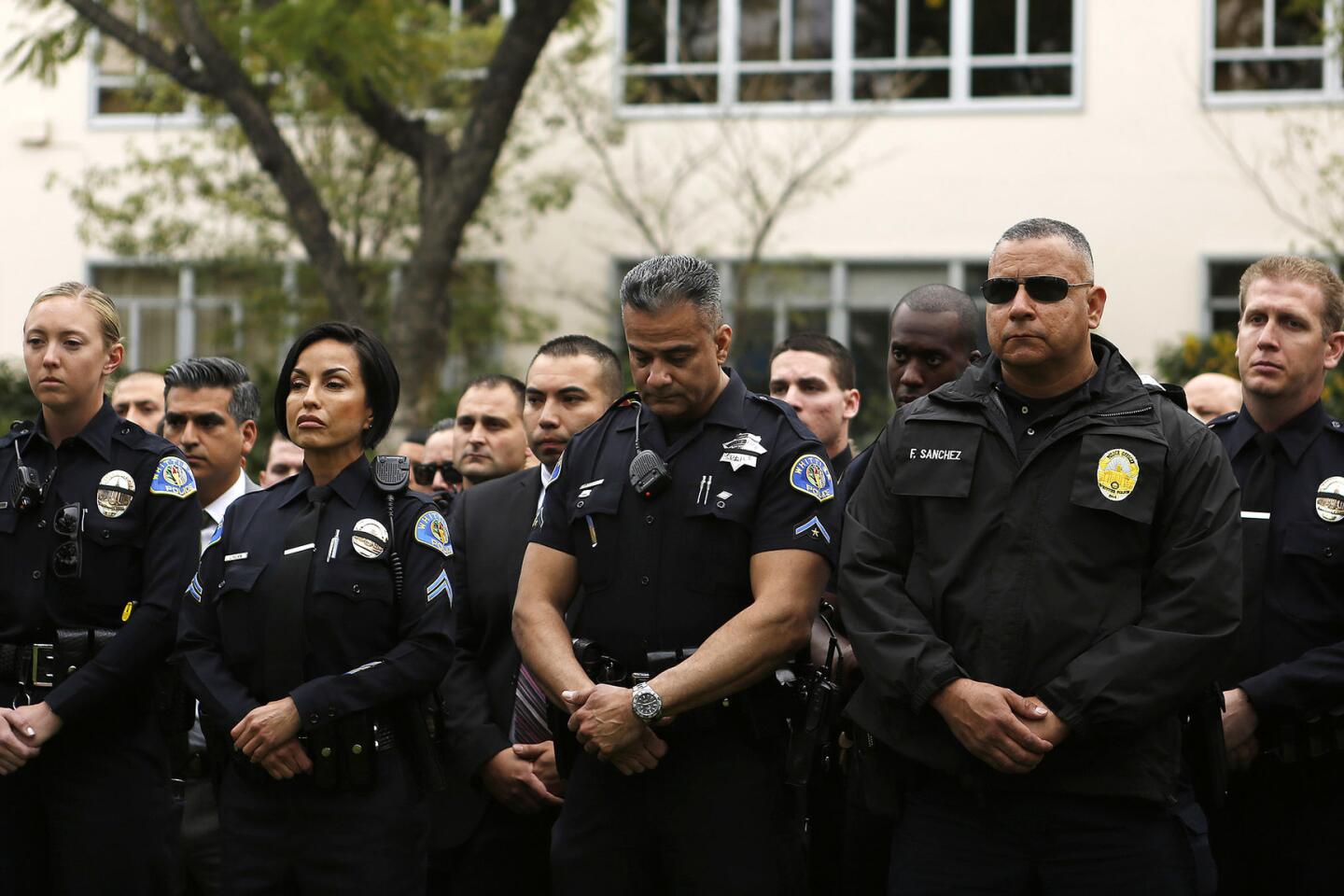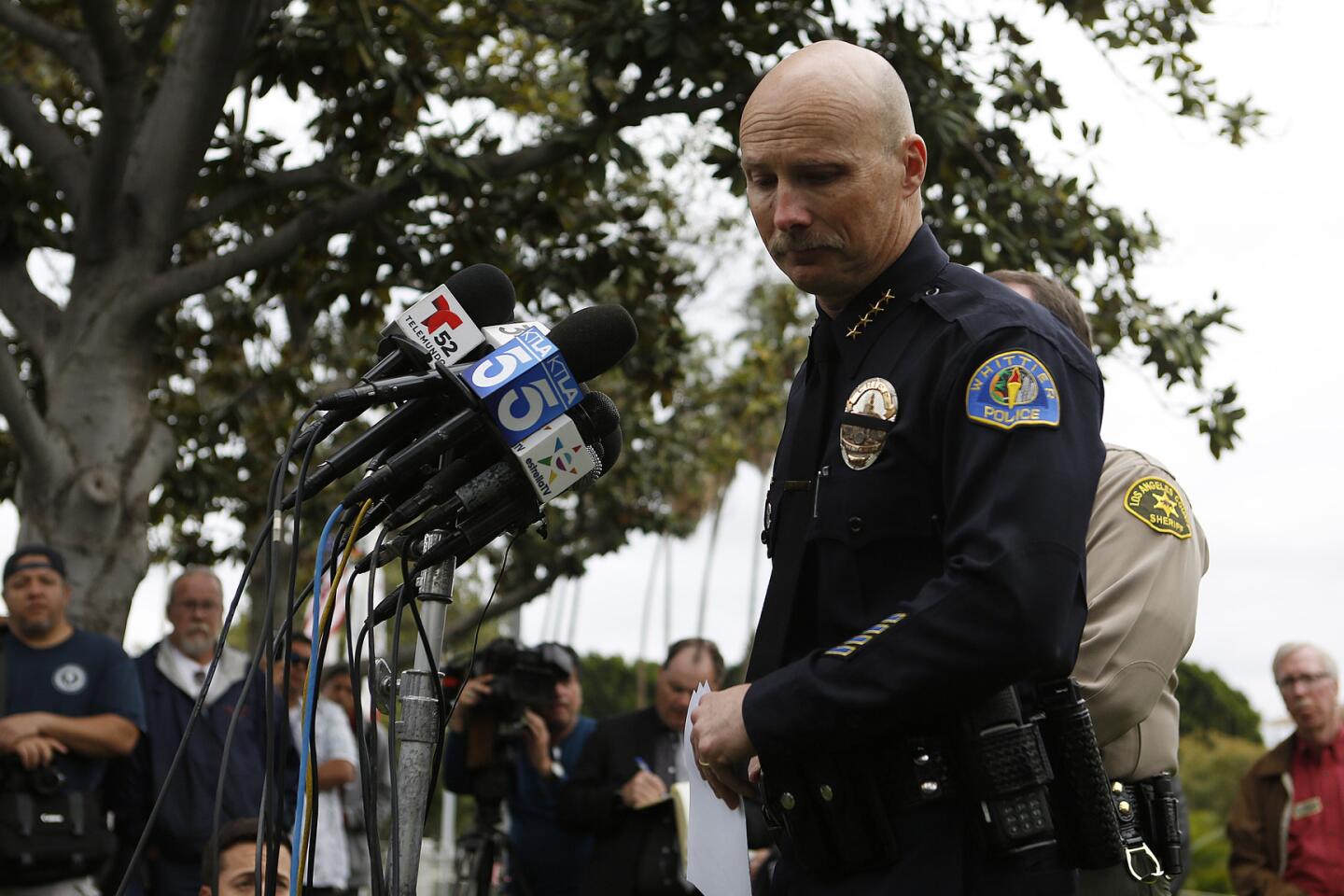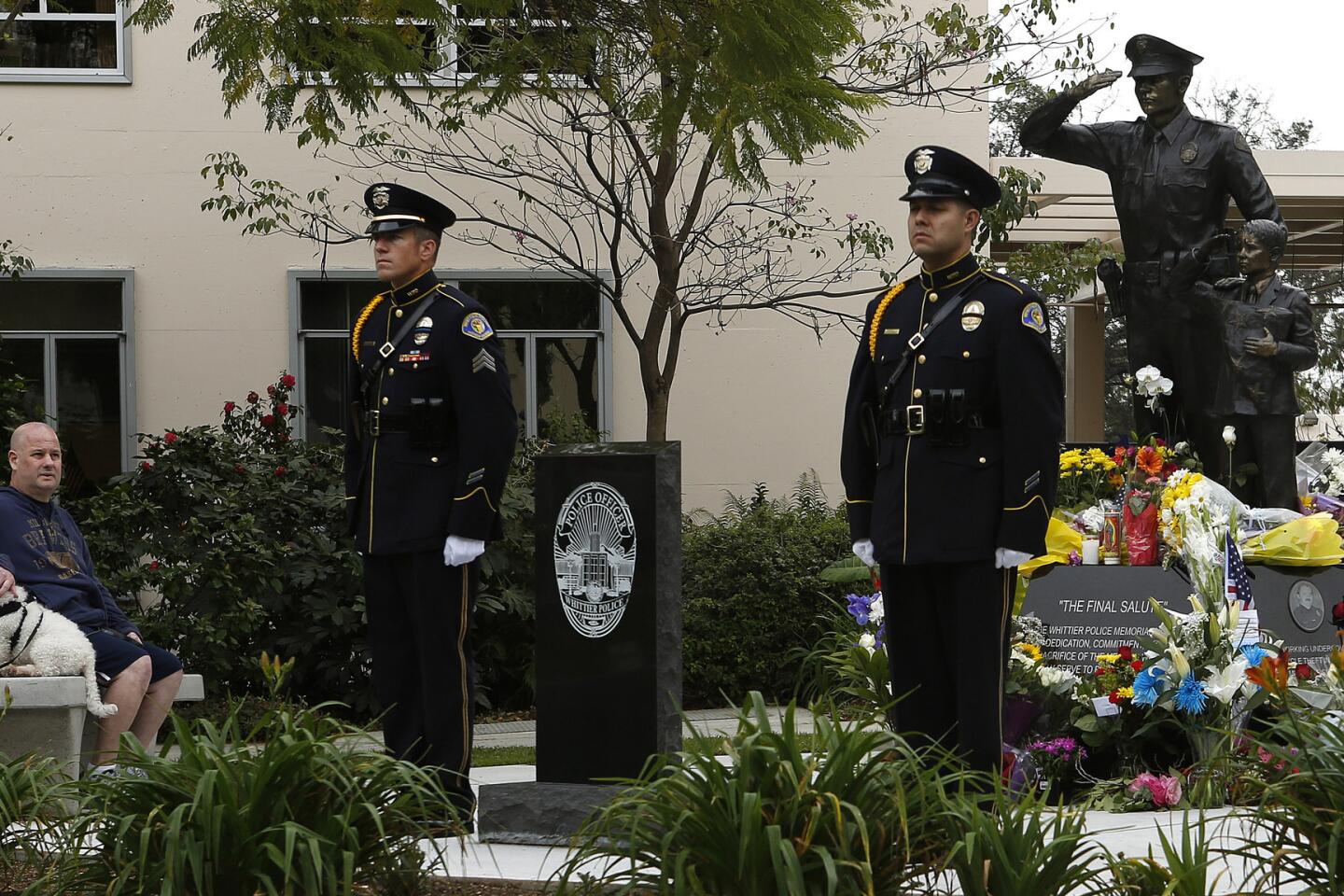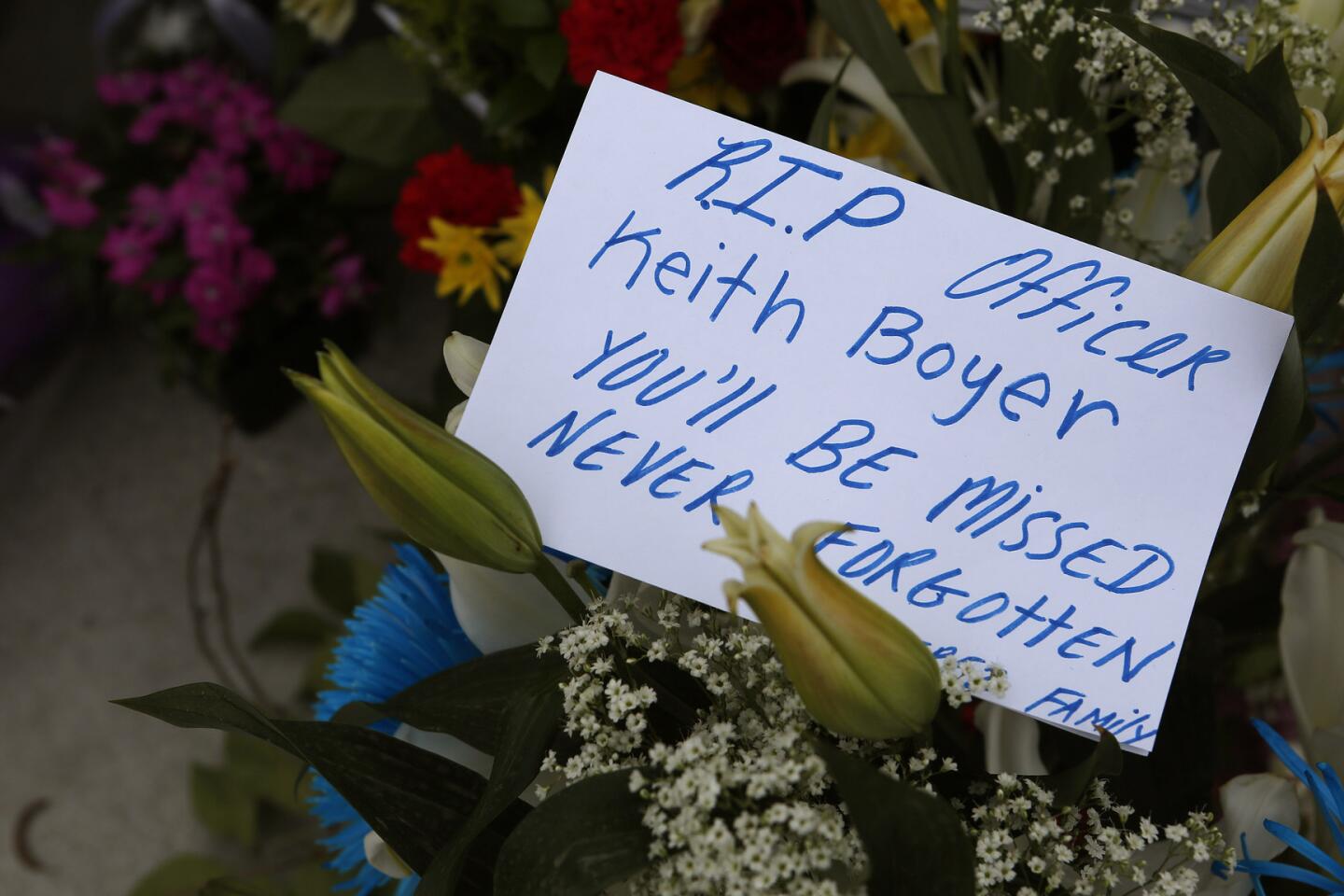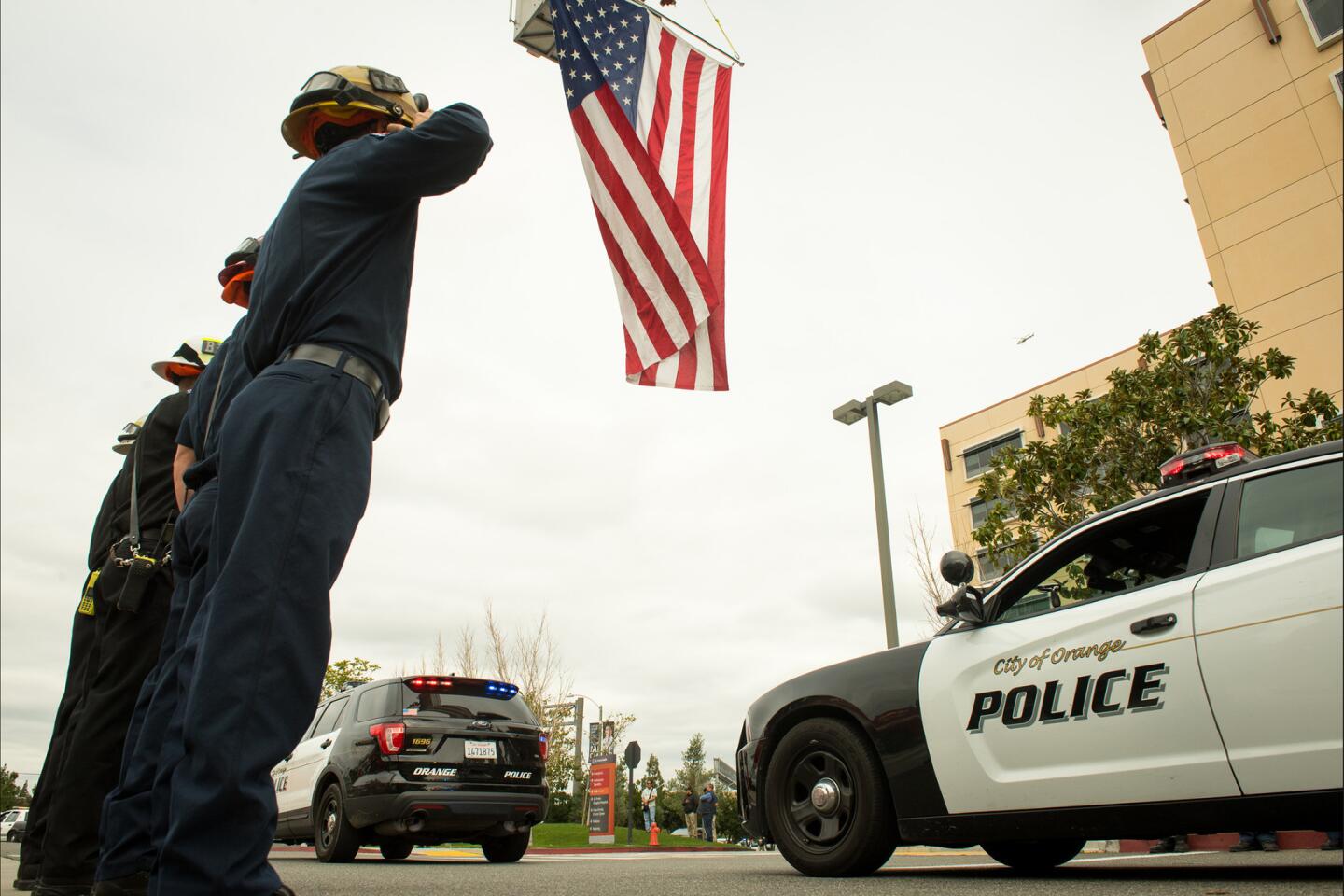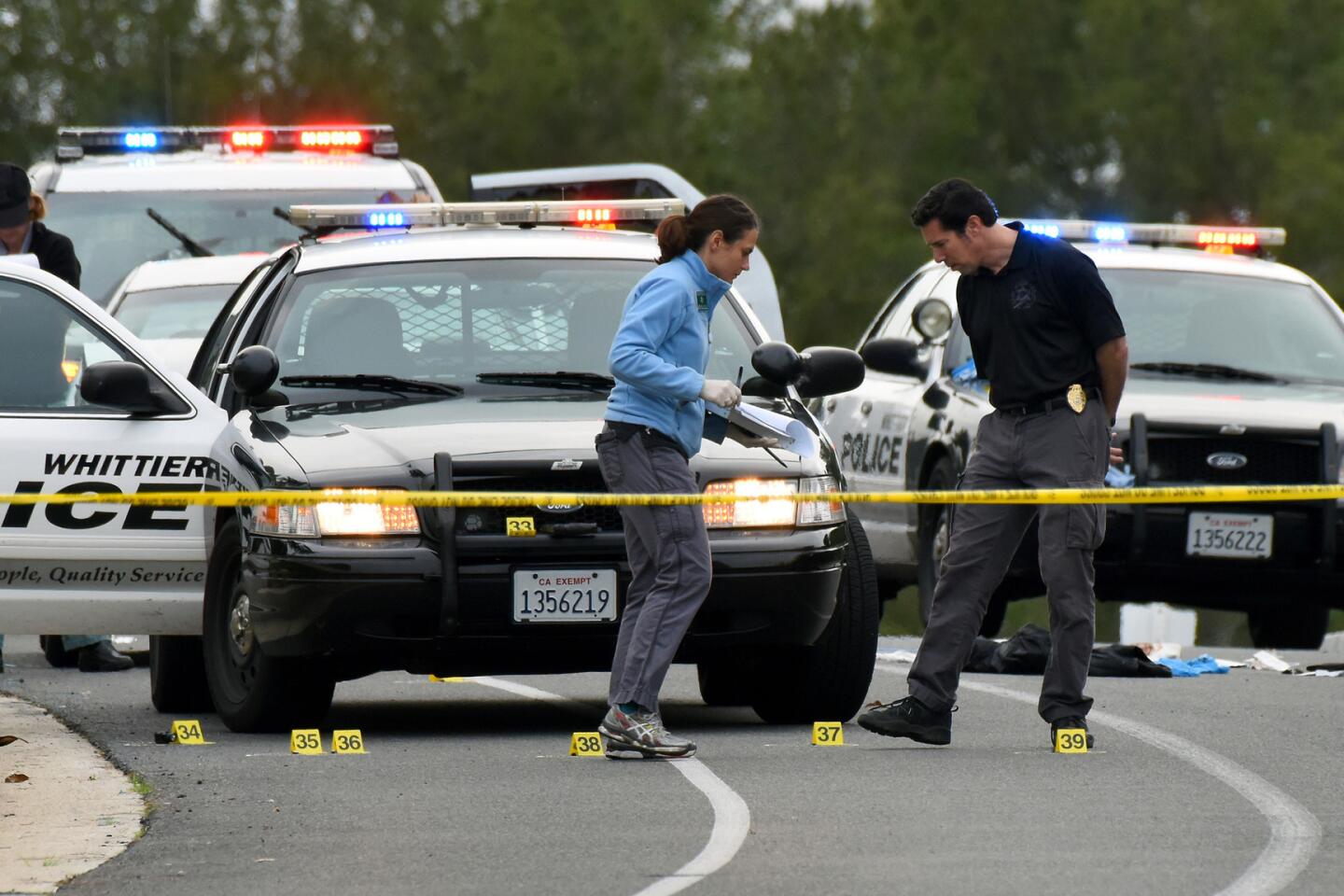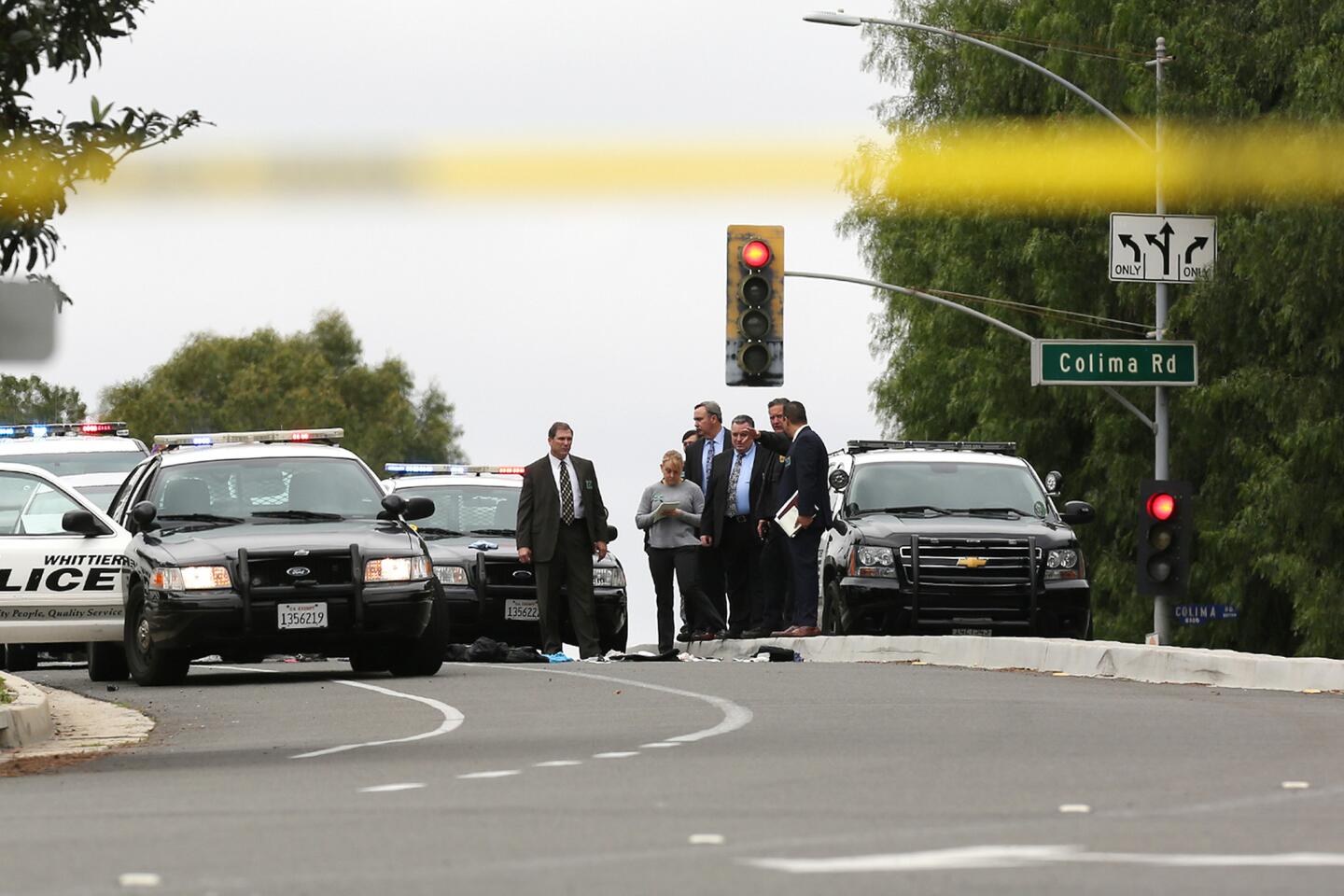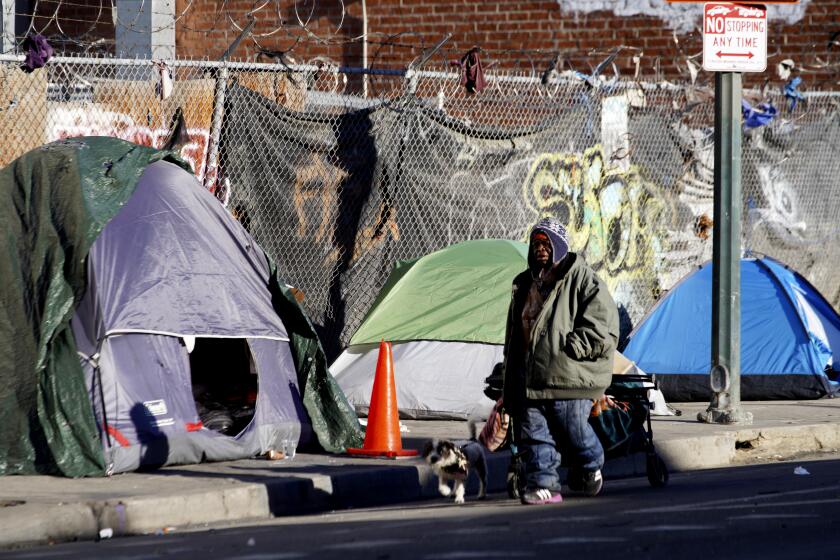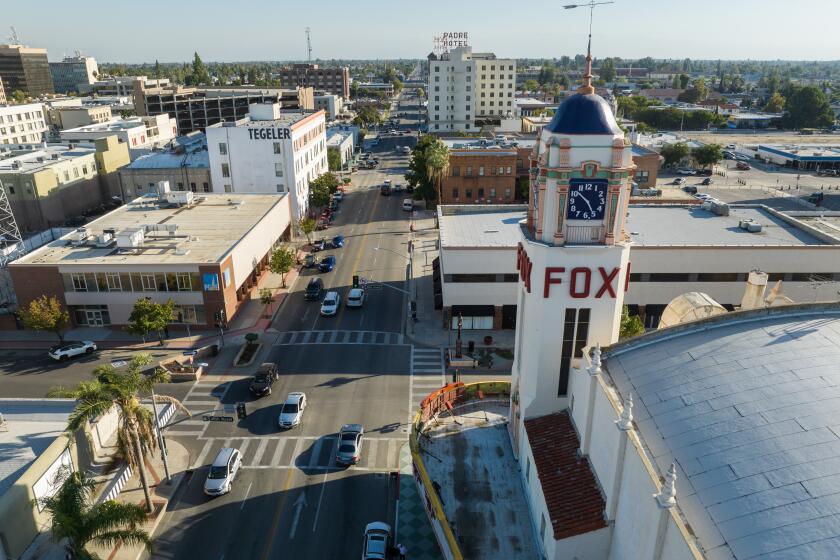Gang member accused of killing Whittier cop had cycled in and out of jail, records show

Michael Christopher Mejia was jailed and released repeatedly for violating his probation.
The gang member accused of killing a Whittier police officer Monday has cycled in and out of jail for repeatedly violating the terms of his release, records show.
L.A. County sheriff’s homicide Capt. Steve Katz on Tuesday identified the suspect as Michael C. Mejia, 26, a career criminal with a history of drugs and violence. Mejia has a “history of control problems,” Katz said.
Mejia is suspected of killing Whittier Police Officer Keith Boyer and wounding another officer in a shootout following a crash involving a stolen vehicle.
Court records show that Mejia was sentenced in 2010 to four years in state prison for robbery and was convicted in July 2014 of grand theft auto and attempting to steal a vehicle. He was given another two-year sentence.
Mejia, who was shot by officers in the deadly gunfight that claimed Boyer’s life and left Officer Patrick Hazell wounded, has been arrested and jailed for short stints several times since July. State officials said he was on probation and under the supervision of the L.A. County Probation Department.
Mejia was sent to state prison in December 2010 after being sentenced to two years for the robbery with a special enhancement of an additional two years for being a gang member. That four-year sentence was reduced by up to 15% for good behavior — a standard practice. The judge gave Mejia 302 days for time already served in jail.
Mejia was paroled on Jan. 26, 2014. He returned to prison on July 30, 2014, on new charges of grand theft auto and vehicle theft. He was sentenced to serve two two-year terms concurrently. He was discharged from Pelican Bay State Prison on April 19, 2016.
In July, he violated terms of his release and got 10 days in jail. He was arrested again in September after authorities moved to revoke his community supervision.
He was arrested in January for again violating the terms of his release and sentenced to a combined 40 days in jail. But he was out again after 10 days, records show. Then, Feb. 2 he was arrested by East L.A. sheriff’s deputies for violating his release terms and “flash incarcerated.”
Mejia was sentenced to 10 days and released Feb. 11. On Monday, before his run-in with Whittier police, he allegedly went on a deadly rampage that began at an East L.A. home, where authorities suspect Mejia in the fatal shooting of a man believed to be his 46-year-old cousin, Roy Torres. Mejia then allegedly stole his car.
Mejia has not been formally booked in the murders and is being held on a probation violation.
Nicole Nishida, a sheriff’s spokeswoman, said the probation violation is the murder of Boyer and attempted murder of Hazell. Nishida said Mejia can be held 10 days for such a violation without being formally booked.
The move is designed to allow detectives more time to investigate the killing. If he is officially booked with murder and attempted murder, prosecutors would have 48 hours to charge him.
Mejia remains hospitalized and is being treated for a gunshot wound, sheriff’s officials said.
Whittier Police Chief Jeff Piper said Mejia is an example of how statewide efforts to reduce incarceration of certain criminals can have tragic consequences.
“We need to wake up. Enough is enough,” Piper said at an emotional news conference Monday, the day Boyer was killed. “This is a senseless, senseless tragedy that did not need to be.”
Los Angeles County Sheriff Jim McDonnell pointed to three measures enacted in the last seven years — Propositions 47 and 57 and Assembly Bill 109 — that he said have led to the release of too many criminals without creating a proper safety net of mental health, drug rehabilitation and other services.
“We’re putting people back on the street that aren’t ready to be back on the street,” McDonnell said. He said the county jail system he runs, the largest in the nation, has become a “default state prison.”
Sheriff’s officials have long criticized Proposition 47, which was approved by voters in 2014 and downgraded some drug and property crimes from felonies to misdemeanors.
They say AB 109 — which moved state prisoners to local lockups — has pushed lower-level offenders out of custody and onto the streets, offering little deterrent against committing new crimes.
Proposition 57, which passed last year, changed California’s “three strikes” rule and made sentencing more flexible, allowing some prisoners who wouldn’t normally have been eligible for early parole to be considered for release.
In Los Angeles County, the jail population has decreased, from 18,500 inmates just before Proposition 47 passed to about 16,500 inmates in November. Narcotics arrests have dropped, with busy police officers deciding that the time needed to process a case is not worth it.
The result, some law enforcement officials say, is that more criminals are now on the streets instead of in jail and are not receiving the drug and mental health treatment the measure had promised. Without the threat of a felony prosecution, they say, defendants are less likely to choose treatment as an alternative to serving time.
But supporters of Proposition 47 dispute the theory that crime increases are connected to the measure. Misdemeanors can still result in sentences of up to a year in jail, and it is up to police officers and prosecutors to enforce those penalties, Michael Romano, a lecturer at Stanford Law School, told the Los Angeles Times in December.
“The idea that Proposition 47 has been responsible for an increase in crime in California over the past year or two is fake news, as far as I’m concerned,” he said.
California Department of Corrections and Rehabilitation officials, while extending their condolences, said that Mejia was never released early from state prison.
“This individual served his full state prison terms as defined by law,” said Jeffrey Callison, assistant secretary at the corrections department. “None of the state’s recent criminal justice reforms — including AB 109, Proposition 47 or Proposition 57 — impacted when this individual was released from state prison. Proposition 57, for example, which was passed by voters in November, has not even been implemented yet.”
Callison said AB 109 did not impact the time Mejia served, but did affect his post-release supervision in April 2016, which put monitoring in the hands of the Los Angeles County Probation Department.
The county’s chief probation officer, Terri McDonald, confirmed that office was supervising Mejia, but declined to provide details.
“He was under probation supervision pursuant to AB 109,” McDonald said. “We are reviewing the conditions of his supervision since being released from state prison in April 2016. However, as this is an active criminal and internal investigation, we cannot discuss any specifics but we will conduct a comprehensive post incident review. Our thoughts and prayers go out to the victims and their families in this senseless homicide.”
Twitter: @LAcrimes
Times staff writer Cindy Chang contributed to this report.
ALSO:
Slain Whittier officer, ‘best of the best,’ was thinking about retiring, chief says
Gunman who killed Whittier officer had fatally shot cousin hours earlier, police say
UPDATES:
5:25 p.m.: This article was updated with additional details from sheriff’s officials about the status of Michael C. Mejia, information about his criminal record and and information from corrections and probation officials.
This article was originally published at 1:15 p.m.
More to Read
Start your day right
Sign up for Essential California for news, features and recommendations from the L.A. Times and beyond in your inbox six days a week.
You may occasionally receive promotional content from the Los Angeles Times.
